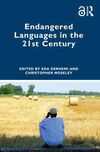"Its 18 chapters provide a wide-ranging snapshot of the state of endangered languages in the contemporary world – including a great deal of historical background – and the methods and practices that have come to characterize the effort to revive and maintain disadvantaged indigenous languages, and the challenges still to be faced.
In the first decades after the end of French rule, Francophone authors engaged in an exercise of rewriting narratives from the colonial literary canon.
Réalités pseudonymes explore la question de la réalité à travers le prisme du nom propre et de ses mécanismes référentiels dans la littérature et les arts au tournant du 21ème siècle.
Victims of the Book uncovers a long-neglected but once widespread subgenre: the fin-de-siècle novel of formation in France.
Trop gascon pour la Cour, Scipion Dupleix et ses contributions aux débats linguistiques du Grand Siècle méritent un nouveau regard. Ses critiques de Vaugelas soutiennent la « liberté d’un chacun » en matière de langue et soulignent les enjeux sociaux des disputes pointilleuses de la grammaire.
Uniting twelve original studies by scholars of early modern history, literature, and the arts, this collection is the first that foregrounds the dialectical quality of early modern Orientalism by taking a broad interdisciplinary perspective.
Proust and the Arts brings together expert Proustians and renowned interdisciplinary scholars in a major reconsideration of the novelist's relation to the arts.
Angelo Tasca, a pivotal figure in 20th-century Italian political history, and indeed European history, is frequently overshadowed by his Fascist opponent Mussolini or his Socialist and Communist colleagues (Gramsci and Togliatti). Yet, as Emanuel Rota reveals in this captivating biography, Tasca—also known as Serra, A.
Genealogies of Fiction is a study of gender, dynastic politics, and intertextuality in medieval and renaissance chivalric epic, focused on Ludovico Ariosto’s Orlando furioso.
The current cultural climate in France is often described as one of “déclinisme” or “sinistrose,” a mixture of pessimism about the national future, nostalgia for the past, and a sinister sense of irreversible decline concerning the present. The notion of “democratic melancholia” has become widely popular, cropping up time and again in academic papers and newspaper articles.









